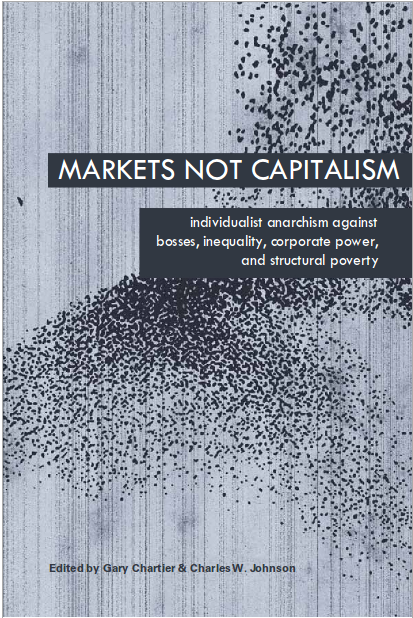Welcome, Reasoners
Since my article on the Coalition of Immokalee Workers, Walmart, and alt-labor
is appearing this morning at Reason.com, a fair number of y’all passing by may be readers who are more or less new to the blog.
Shared Article from Reason.com
Free-Market Labor Wins Wage-Boost Victory
Economic liberty shouldn't simply assume a pro-business stance, or discuss only the privileges government extends to unions.
Charles Johnson @ reason.com
So–welcome! I’m Charles W. Johnson; often, I write online under the handle Rad Geek.
(Not because I’m trying to hide who I am, but because it suits me, and because sometimes it helps me avoid being confused with some folks I am not.) I’m an individualist anarchist, living in Alabama. I write this blog, I co-edited (together with Gary Chartier) the left-wing market anarchist anthology, Markets Not Capitalism (Minor Compositions/Autonomedia: 2011). I write occasional columns for libertarian and anarchist outlets including The Freeman, Reason.com, Free Voices, and The Industrial Radical. I publish a lot of small-press anarchist and left-libertarian literature through the Distro of the Libertarian Left. If you’re new to the blog here, and trying to get oriented, here’s some things you might find interesting to read, which will give you some broad idea of where I’m coming from, and what I care about.
I’ve written a lot over the years about the C.I.W., both basic event coverage of some of their main campaigns, and also a fair amount of my own commentary on what I take to be the significance of their use of social protest and state-free, market-based methods in their activism.[1] If you’ve come here from the article and you want to read more about the C.I.W. or the context of its campaigns, I have some links, both to my own writing and also to a number of other sources that I consulted while preparing the column on the recent Walmart victory. Those are at the bottom of the post, though, so feel free to scroll right down past the following, which is mostly just orientation on me and where I’m coming from.
Speaking generally, I am a market anarchist: I am radically opposed to any invasion of economic liberty and to the state as such, and I am in favor of freed markets, free exchange, voluntary association, open competition and individual ownership of property. But, unlike many pro-capitalist libertarians, I argue that one of the likely and important features of freed markets is their tendency to cut against socioeconomic inequalities, to provide a space for economic alternatives to status-quo corporate capitalism, and to undermine and replace traditional top-down firms or employer-employee relationships. The kind of things I believe are often called free market anticapitalism
or left-wing market anarchism.
For more on what I mean by all that, and why I believe it:
Pigs as a Paradigm (17 August 2013) and We Know Other Marketplaces (20 August 2013)
Mutual Markets vs. Corporate Capitalism: A Formulation (10 October 2010)
Writing about the C.I.W.’s boycotts, and responding to some common, but I think misguided, objections from fellow libertarians, actually played a major role in clarifying these issues for me; see, in particular, my discussion with Dan D’Amico and Art Carden in ¡El pueblo unido jamás será vencido! (23 March 2005) and in Anarquistas por La Causa (31 March 2005).
I also think that rambunctious nonviolent social activism, worker-owned enterprises and radical labor unions, based on voluntary association without government privilege, and an anti-authoritarian culture of worker solidarity, are all an important part of a flourishing free market.
On free-market unionism, in general, Free the Unions (and all political prisoners)! (1 May 2004)
And also In reply to a reply by J.H. Huebert and Walter Block
On free-market social and economic activism generally, We Are Market Forces (12 June 2009)
I’m against Civil Rights Acts because I’m for Civil Rights Movements, in The Freeman (September 2010) on direct action and anti-racist activism
Radical healthcare reform (25 October 2007) and Universal health care does not mean government health care (28 May 2012), on corporate healthcare and grassroots alternatives
Since Walmart is at the center of the story, I should say that, while I am immensely pleased to see Walmart signing an agreement for the Fair Food Program, I think that many of the common criticisms of Walmart’s business model, exploitative labor practices, and economic dominance are justified, and that I would be quite happy in general to see Walmart constantly confronted and challenged with some really vigorous and uncompromising competition, social criticism and alt-labor organizing and activism. I say this not because I object to business, or to low prices, or whatever, but because I object to highly centralized state-capitalist business models that depend on, and heavily exploit, corporate welfare, eminent domain, and other favors from corporatist local governments.
More broadly, much of my writing on economic questions aims to focus attention on the relationship between the economic privileges granted by the State, class, poverty, and corporate power.
Scratching By: How Government Creates Poverty As We Know It, in The Freeman (December 2007)
Trickle-Down Politics: The Only Good Government Is No Government, in The Freeman (23 August 2010)
On crutches and crowbars (6 March 2008), on why left-libertarian views on economic privilege and labor do not imply any compromise or gradualism on the abolition of all statist controls, including regulations that supposedly
help
workers.
I am an Anarchist. I don’t care about smaller government, or limited government, or about Constitutions, or about electing libertarian
candidates to political office. I am the farthest thing possible from a conservative. I believe in abolishing the State as such, and in doing so through the practice of education, solidarity, and direct action.
GT 2010-03-02: Liberty, Equality, Solidarity discusses at length why I am an anarchist, and why I think that
limited government
is actually an incoherent and destructive goal for libertarians to adopt.GT 2008-01-25: Take the A-Train discusses why I think that market anarchists should make their primary political alliances with other anarchists, not with Constitutionalists or minimal-statists.
GT 2008-09-17: The statist
We don’t
, GT 2005-09-17: International Ignore the Constitution Day, and GT 2007-12-28: A Higher Law Than the Constitution explain why I'm not a Constitutionalist, and why I think appeals to the paper Constitution are either useless or harmful struggles for liberty and peace.GT 2009-04-04: The State of the Debate, GT 2008-02-25: I am shocked!–shocked!–to find that politics is going on in here! and GT 2008-09-10: The Stupid Campaign Season Distraction and GT 2013-08-17: Direction of Fit (Progressive President Edition) discuss problems with electoral politics, as a strategy, that I take to be built in to the structure of partisan elections.
GT 2013-12-23: The Age of Bronze, on why conservative nostalgia for
the old America
is a pure fantasy of social privilege.
As an Anarchist, and as a human being, I am utterly and irreconcilably opposed to all forms of government warfare.
GT 2009-01-25: How do you ask a man to be the last man to die for a mistake? and GT 2011-05-04: Military targets discuss the wars inflicted on the world under our current Progressive Peace President.
GT 2005-08-09: A day that will live in infamy, GT 2007-12-26: Bomb after bomb, and GT 2009-01-05: In which commentary becomes copy-and-paste explain some of the reasons why I’m not just opposed to The War here and now, but in fact condemn all government wars, on principle, and in all nations and all ages. I don’t believe in
good wars
andbad wars;
in fact, I think that the wars people tend to be most invested in passing off asgood wars
— wars like World War II or the American Civil War — are typically the worst, most ghastly wars in recorded history.
I believe that the nationalistic violence of the warfare State is closely linked with the paramilitary patrols, police state, and nationalistic violence of government border controls — which are nothing other than international apartheid. See for example:
- GT 2008-05-14: Voyage of the S.S. St. Louis (on the use of government border laws against war refugees)
- GT 2008-01-31: Bordercrats Against Joy and Plenty (on government border controls in the perpetual military siege of Gaza)
- GT 2007-11-12: Sin Fronteras
I also believe that the violence of the U.S. government’s imperial military abroad is closely linked with the repressive violence of (increasingly militarized) paramilitary police forces within the U.S. See for example:
- GT 2013-08-08: By the book
- GT 2008-09-25: How cops see themselves
- GT 2008-09-19: No, seriously, I could swear the water in this pot is getting a little hotter…. (#6)
- GT 2008-05-10: Cops are here to protect you (#3)
- GT 2010-01-23: Siege mentality
And as a feminist I think that the violence of men’s wars and of men’s law enforcement
are closely linked with the violent ideals of masculinity and patriarchy that men are brought up with in our society. For more, see:
- GT 2006-07-31: War and Manhood
- GT 2009-08-24: Rapists on patrol (#6) / Men in Uniform (#4)
- GT 2008-05-16: Women and the Invisible Fist
- Charles Johnson and Roderick Long (2005): Libertarian Feminism: Can This Marriage Be Saved?
I’m against all forms of Intellectual Property restrictions, which represent not genuine forms of property, but a grant of monopoly privileges over the minds of other people — which I view both as tyrannical in themselves and also as immensely, lethally destructive in the effects of the coercive monopolies that they grant:
Thanks for coming on down; I hope you stay a while, do some reading, and enjoy the blog. So, come, let us Reason together . . . .
Further reading on C.I.W., the Fair Food Program and Alt-Labor
As I mentioned, I’ve been following the Coalition of Immokalee Workers and the Fair Food Program for over a decade now. Here are some other articles that I’ve written on C.I.W.:
- GT 2001-08-30: ¡Sí se puede!, on the Taco Bell boycott, and the UFW’s endorsement of CIW’s campaign
- GT 2005-03-23: ¡El pueblo unido jamás será vencido!, on CIW’s victory in the Taco Bell boycott, the non-state methods of the CIW, and a response to misguided attacks by Dan D’Amico and Art Carden
- GT 2005-03-31: Anarquistas por La Causa, more exchange with Dan D’Amico on labor organizing,
capitalism,
and free markets. - GT 2007-04-19: The CIW wins a groundbreaking wages and conditions agreement with McDonalds
- GT 2007-11-30: Coalition of Immokalee Workers marches in Miami
- GT 2007-12-06: Solidaridad
- GT 2008-05-23: Victory for the Coalition of Immokalee Workers in the Burger King penny-per-pound campaign
- GT 2008-05-27: Even better than I thought: victory for the Coalition of Immokalee Workers against the Florida Tomato Growers Exchange, too
- GT 2008-07-03: ¡Chipotle, escucha: estamos en la lucha!
- GT 2008-09-08: Slavery in Florida’s tomato fields
- GT 2008-09-10: Coalition of Immokalee Workers announces another victory in penny-per-pound agreement with Whole Foods
- GT 2008-12-02: Victory to the farmworkers! Coalition of Immokalee Workers announces that Subway has signed on to the penny-per-pound pass-through agreement
- GT 2012-10-19: Coalition of Immokalee Workers victory in Denver; struggle in Miami
And here are a bunch of things that other people have written, which I consulted at some point or another recently while preparing my column, and which you might find useful as elaboration, context or backdrop about C.I.W., the Fair Food campaign and the creative activism used to win it, or the development and direction of alt-labor groups in general.
- C.I.W., BREAKING NEWS: Walmart joins CIW’s Fair Food Program! (16 January 2014), original release from Coalition of Immokalee Workers about the agreement.
- C.I.W., American history happens in a watermelon shed… (January 20, 2014). ciw-online.org. Press round-up of reaction to the C.I.W.’s winning an agreement from Walmart.
- Associated Press, Wal-Mart joins initiative on farmworker pay in Fla (January 16, 2014). Washington Post.
- Bernice Young, Wal-Mart signs deal with farmworker program that fights harassment (January 16, 2014). The Center for Investigative Reporting. Report focusing on the code of conduct included in Fair Food Program certification, and especially its efforts to address problems of sexual harassment and rape in the fields.
- Willy Blackmore, Here’s Why Florida Farmworkers Are Thrilled About Walmart’s Extra Pennies (January 17, 2014). takepart.
- Barry Estabrook, Labor Takes Historic Stride Forward as Walmart Joins Fair Food Program (January 17, 2014). CivilEats.com.
- Katrina vanden Heuvel, Sweet Victory: Coalition of Immokalee Workers Wins (23 May 2008), an analysis from back when C.I.W. won an agreement from Burger King, including some interesting discussion by Eric Schlosser on the C.I.W.’s strategy of deliberately avoiding governmental or political mechanisms, in favor of market action.
- Fair Food Standards Council: Fair Food Program Report 2011-2013 (20 November 2013). 62pp detailed glossy PDF report with facts, figures, testimonials, and descriptions about the first two years of the full implementation of the Fair Food Program in Florida, how the program works, the amount of money passed through to workers in the first 3 years, the new code of conduct policies, etc.
- C.I.W.: PUBLIX, news on C.I.W.’s ongoing picket and protest campaign to convince the Publix grocery store chain to join the Fair Food Program.
- C.I.W. (video interview), Coalition of Immokalee Workers (CIW) talks about Radio Conciencia (20 November 2012). YouTube. A nice interview about one of their ongoing community projects, a low-power FM station for community news and discussion, based in Immokalee. More about the low-power FM station at ciw-online, Radio Anniversary Report (9 December 2002), ciw-online.
- C.I.W., Community Center News (10 May 2009). ciw-online.org. Another community program, the community center that C.I.W. has built in Immokalee.
- Josh Eidelson, Alt-labor (29 January 2013). The American Prospect.
- Josh Eidelson, Who Should Fund Alt-Labor? (17 July 2013), The Nation.
- J. D. Tuccille, Organized Labor Discovers the Joys of Voluntary Association (16 October 2013), Reason.com.
- Robert VerBruggen, Why Conservatives Should Love
Alt-Labor
(16 October 2013), RealClearPolicy, and Reihan Salam, The Virtues of Alt-Labor (October 16, 2013), National Review. A couple of conservative views in favor of alt-labor, or at least the shift towards alt-labor and away from NLRB unionism. - F. Vincent Vernuccio, Attack of the UFOs (4 September 2013), Capital Research Center, and WorkerCenters.com: Labor’s Loophole. A couple of fairly comical conservative attacks on alt-labor, in which conservative pro-business lobbies stick up for limited government and free enterprise by moaning about
loopholes
in the labor law, and asking Congress to pass more rigorous labor regulations so that the NLRB can intervene more often in labor disputes. - WorkerCenters.com: Coalition of Immokalee Workers and Worker Center Watch: Coalition of Immokalee Workers, much the same, focused on the grave evils of the C.I.W., in particular, operating through unregulated market processes.
- Rural Migration News, Florida and NC: FLOC and CIW Boycotts (July 2010). Rural Migration News. Analysis of secondary boycott strategies by farmworkers’ groups, including CIW.
- OUR Walmart, OUR Walmart, Supply Chain and Warehouse Workers Renew Calls for Improving Jobs At Walmart (January 16, 2014). OUR Walmart, an alt-labor group which has been using pickets and high-profile walk-outs to organize associates on Walmart shopfloors, takes notice of the Coalition of Immokalee Workers’ win, and says that it intends to keep up its own pressure on Walmart for improved pay and conditions for employees working within Walmart retail shops, in spite of Walmart’s large-scale retaliatory firings.
- [1]Full disclosure: besides having written frequently about the C.I.W., many years ago I was also indirectly involved in setting up an organizing workshop for C.I.W. that led to an impromptu radical cheerleading picket at our local Taco Bell in Auburn.↩


